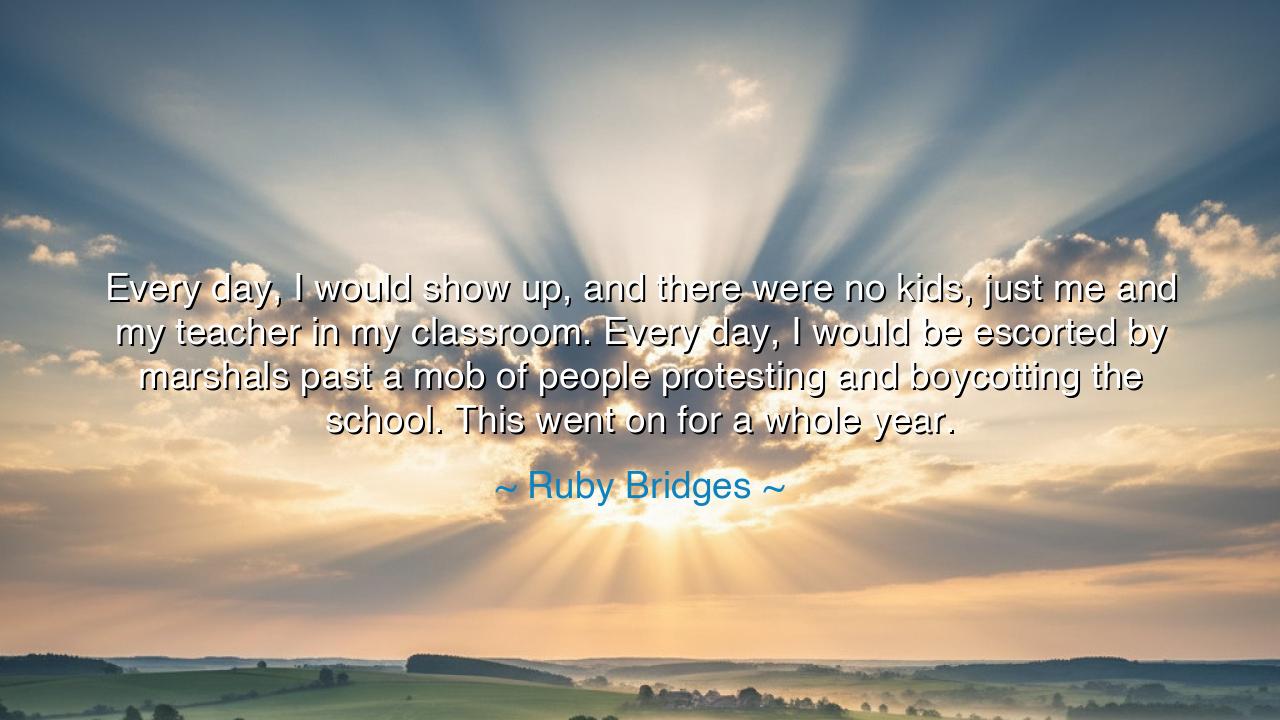
Every day, I would show up, and there were no kids, just me and
Every day, I would show up, and there were no kids, just me and my teacher in my classroom. Every day, I would be escorted by marshals past a mob of people protesting and boycotting the school. This went on for a whole year.






The words of Ruby Bridges—“Every day, I would show up, and there were no kids, just me and my teacher in my classroom. Every day, I would be escorted by marshals past a mob of people protesting and boycotting the school. This went on for a whole year”—echo like a psalm of courage in the face of hatred. They speak of a child who bore the weight of history, a little girl walking through jeering crowds, yet walking still. At six years old, she carried the burden of a nation’s struggle with race, equality, and justice. Her memory is not just of empty classrooms, but of the emptiness of compassion in the hearts of those who opposed her.
The origin of this quote lies in the great struggle for desegregation in the United States. In 1960, Ruby Bridges became the first Black child to attend an all-white elementary school in New Orleans. Federal law had declared segregation unconstitutional, but the hearts of many still clung to prejudice. And so marshals had to guard a little girl as if she were a soldier on the front lines. For indeed, she was. With every step past the mob, with every day spent alone in her classroom, Ruby embodied a battle for justice that shook the very foundations of American society.
Her words reveal both tragedy and triumph. The tragedy is plain: a child deprived of companionship, surrounded not by laughter but by hostility. The other children were kept away, their parents consumed by hatred. Yet in that empty classroom there was also triumph, for Ruby did not turn back. She showed up every day, teaching the world a lesson in resilience. With her teacher by her side, she proved that education is not merely the filling of a classroom, but the shaping of a soul willing to endure hardship for the sake of a higher truth.
Consider how many others in history have walked alone against the multitudes. Galileo stood alone before the Church, declaring that the earth moved, while crowds condemned him. Joan of Arc walked into battle with faith as her shield, while the world doubted her. So too did Ruby Bridges walk into her school, her small body flanked by marshals, yet her spirit stronger than the voices of thousands. History often advances not through armies, but through the solitary courage of those willing to walk through hatred with dignity.
The emotional power of her story lies in its innocence. Ruby was only a child. She did not seek fame or conflict; she sought only to learn. And yet, because she walked forward when others wanted her to retreat, she became a symbol of hope. She reminds us that sometimes the greatest revolutions are carried by the smallest shoulders, and that purity of heart can shame the cruelty of the world.
The lesson for us is clear: courage is not the absence of fear, but the willingness to walk forward even when fear surrounds you. Ruby’s classroom, empty of children but filled with history, is a reminder that progress often feels lonely at first. Change comes when someone dares to stand alone until others find the strength to join them. If a child of six can do so, then what excuse have we, grown and able, to remain silent in the face of injustice?
What, then, shall we do? Let us remember Ruby Bridges not as a figure of the past, but as a guide for the present. Let us teach her story to our children, so they know that justice is often costly but always worth the price. Let us walk with courage into the places where we are unwelcome, carrying dignity as our shield. And when we see mobs of prejudice, let us stand firm, knowing that history belongs not to the crowd, but to the one who keeps walking forward.
Thus, Ruby Bridges’s words endure as both testimony and command. Every day she showed up. Every day she walked past hatred. Every day she proved that even the smallest child can stand as a giant when truth is on her side. And so her story becomes our inheritance: that when the world is against you, still you must walk, for in your walking lies the hope of generations yet to come.






AAdministratorAdministrator
Welcome, honored guests. Please leave a comment, we will respond soon